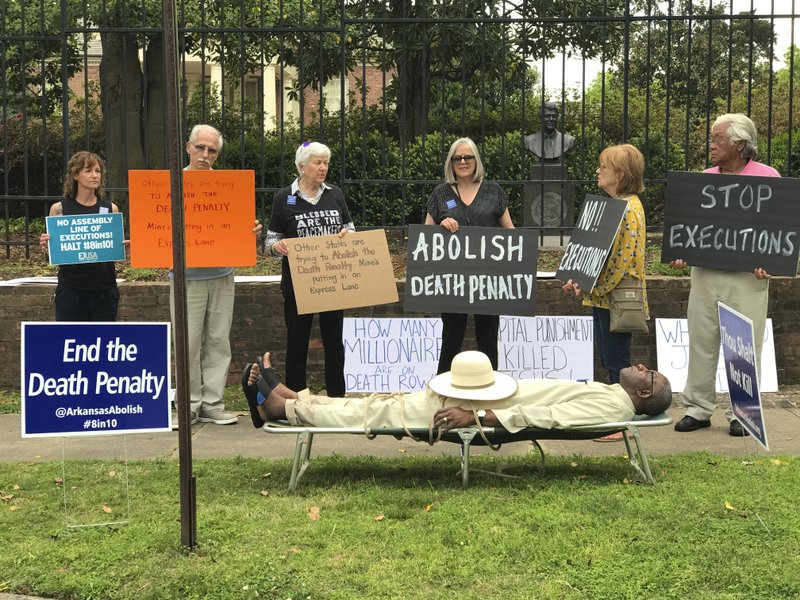Arkansas' judicial watchdog agency filed formal charges Friday against Pulaski County Circuit Judge Wendell Griffen over his 2017 death-penalty protest, launching a high-stakes case with potential sanctions ranging from counseling to removal from office.
The charges -- a result of a special counsel's investigation -- initiates public, noncriminal proceedings in a matter that involves free speech, freedom of religion and the judiciary's impartiality, as well as the death penalty and property rights.
Griffen and the Arkansas Supreme Court filed dueling complaints against each other in April 2017 after the high court sanctioned the judge from hearing any cases involving the death penalty. A special counsel's investigation into Griffen's complaint against the Supreme Court is ongoing.
Griffen had been photographed while he lay on a cot during a public demonstration outside the Governor's Mansion on Good Friday last year -- the eve of what was then scheduled to be a series of seven Arkansas executions over 11 days.
Earlier that day, April 14, 2017, Griffen effectively put the state's execution plans on hold by ruling in favor of a drug supplier that tried to stop the use of its medication in lethal injections.
A "statement of allegations" released by the state Judicial Discipline and Disability Commission accuses the judge of violating up to nine rules in the Arkansas Code of Judicial Conduct.
It also accuses him of violating "Canon 1," which says a judge must "uphold the independence, integrity and impartiality of the judiciary" and "avoid impropriety and the appearance of impropriety."
Griffen's attorney, Michael Laux, said in a news release that the judge is a victim of a "vindictive" investigation.
"We're, unfortunately, not surprised by today's announcement," Laux said by phone. "However, we are extremely dismayed by the lack of effort and diligence that appears to have gone into the investigation. We will have a full-throated response to issue on Monday."
Friday's announcement marks the first formal charges the state's judicial disciplinary commission has filed against a sitting judge since July 2017, when Saline County Circuit Judge Bobby McCallister was accused of failing to pay income taxes. McCallister ultimately agreed to resign.
The Judicial Discipline and Disability Commission's full-time staff attorneys recused from the cross investigations into Griffen and the state's high court. Rachel Michel of Mississippi led the investigation into Griffen. J Brent Standridge of Benton was appointed to investigate the judge's complaint.
Griffen will be given the opportunity to request depositions and copies of investigative materials, and he has the option to file a motion to dismiss the charges. The case will proceed similar to a civil matter.
A nine-member panel -- three judges, three attorneys and three public members -- will preside. Unless the charges are dismissed or settled, the panel will decide by majority vote whether the evidence is "clear and convincing" enough to prove the allegations.
If the allegations are proven, the commission has a range of sanctions at its disposal, including a public reprimand or mandated professional counseling. It could also recommend that the Arkansas Supreme Court take stronger action, such as a suspension or removal from office.
The statement of allegations said Griffen is subject to sanctions in Arkansas Code Annotated 16-10-410, which provides for the removal of a judge from office under a number of circumstances, including "willful violation" of the Arkansas Code of Judicial Conduct.
Griffen's April 14, 2017, ruling granted a temporary restraining order requested by McKesson Corp., which had accused the state Department of Corrections of skirting company rules to obtain a batch of vecuronium bromide. Arkansas uses the drug, a paralytic that prevents breathing, as the second in its three-part lethal injection process.
"It had the effect of stays of execution in the executions ... which Judge Griffen would not have otherwise had authority to enter," the statement of allegations says. Also that day, he attended an "anti-death penalty rally" and, later, a Good Friday prayer vigil, the charges say.
"Judge Griffen holds a right to free speech, but once Judge Griffen asserted his free speech in unequivocal opposition to the death penalty, he had an obligation to disqualify himself in every case effecting the death penalty," the allegations say.
Griffen, who also has a pending federal civil rights lawsuit against Arkansas Supreme Court justices, has said the prayer vigil "remembered that Jesus was a subject of capital punishment." Griffen participated in a similar demonstration this year on Good Friday.
"Again, I lay on a cot in silent prayer," he wrote in an April 18 post to his blog, called Justice is a Verb! "Again, I had my Bible. Again, I wore a button calling for an end to the death penalty."
The disciplinary commission's allegations cite photographs and signs from the 2017 demonstration as evidence contrary to Griffen's statement that he lay on the cot "in solidarity with Jesus." It says the "placard on Judge Griffen's body did not refer to Jesus or His crucifixion."
"While the [commission] has no basis on which to evaluate Judge Griffen's motive or to question any good faith belief, the record fails to support any primary religious motive of anti-death penalty vigil, but the record does establish that Judge Griffen was dressed in what appears to be a traditional inmate jumpsuit or a reasonable facsimile thereof, and he was wearing a button or sign that compelled the State of Arkansas to 'end the death penalty,'" the allegations say.
A Section on 06/09/2018
